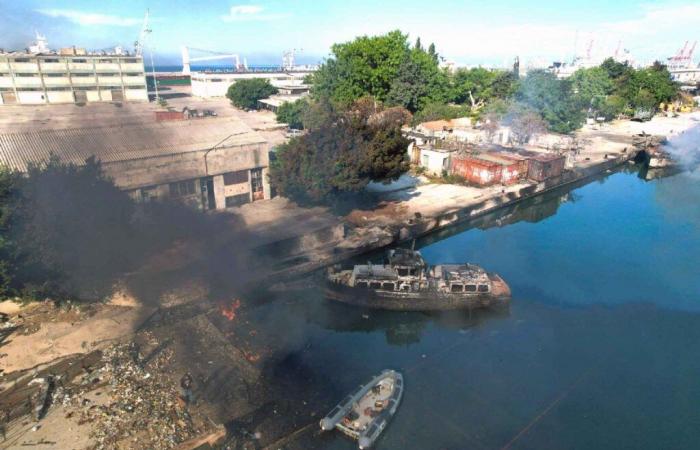After taking control of the buffer zone on the edge of the occupied part of the Golan Heights, in “violation” of the 1974 disengagement agreement, according to the UN, Israel carried out massive attacks against Syrian military installations .
The Syrian Observatory for Human Rights (OSDH), which relies on a vast network of sources in Syria, announced yesterday that the Israeli army “destroyed the main military sites in Syria”, after having carried out more than 300 airstrikes in the country, since the capture of Damascus by the rebels and the fall of President Bashar Al Assad.
Israel, among other things, bombed airports, radars, arms and ammunition depots and military research centers in several regions, including Damascus, and damaged Syrian navy ships by attacking a unit of air defense near the large port of Latakia, in the northwest of the country, according to this NGO.
AFP journalists based in the capital heard loud explosions at dawn, with AFP footage showing thick columns of smoke above the center, where fighters from rebel forces who took Damas Sunday patrol the streets and are stationed in the central Umayyad square.
A scientific research center in Damascus, under the Ministry of Defense, targeted by an Israeli raid, reports the OSDH, was completely destroyed. This center was, according to the United States, linked to the Syrian chemical weapons program. According to the OSDH, Israel intends to destroy “the remaining weapons” of the former power, an ally of Iran and Lebanese Hezbollah as well as Russia.
Israeli Defense Minister Israel Katz confirmed that Israeli navy missile ships had carried out a “large-scale operation” against the Syrian fleet. “The Israeli army has carried out operations in Syria in recent days to strike and destroy strategic capabilities that threaten the State of Israel.
The navy operated last night to destroy the Syrian fleet with great success,” Katz said while visiting a naval base in the northern city of Haifa. The minister also warned Syria’s new leaders not to follow “the path of Al Assad”, in reference to deposed President Bashar Al Assad.
The Israeli army, which denied reports of an advance of its tanks towards Damascus, also confirmed that its forces “are stationed in the buffer zone” with Syria on the edge of the occupied part of the Golan Heights. and annexed by Israel, “and at defense points near the border” to “protect” the country.
Israeli Prime Minister Benjamin Netanyahu announced on Sunday, after the fall of Syrian President Bashar Al Assad, that he had ordered the army to “take control” of the Golan buffer zone. A “limited and temporary” measure taken for security reasons, according to Foreign Minister Gideon Saar.
Strong condemnations
The deployment of the Israeli army in the Golan buffer zone, in southwest Syria, has been denounced by several countries. The Turkish Foreign Ministry denounced Israel’s “occupation mentality” following the Israeli incursion into the Golan buffer zone. “We strongly condemn Israel’s entry into the buffer zone between Israel and Syria as well as its advance into Syrian territory.
(…) In this sensitive period when the possibility of achieving the peace and stability to which the Syrian people have aspired for many years appears, Israel is once again displaying its mentality of occupation,” the ministry said in a press release. For its part, Iran condemned as a “violation” of the law the incursion of the Israeli army into the buffer zone of the Syrian Golan.
“This aggression is a flagrant violation of the Charter of the United Nations,” criticized the spokesperson for Iranian diplomacy, Esmaïl Baghaï, in a press release published Monday evening. For its part, Jordan denounced the deployment, the day before, of the Israeli army in the Golan buffer zone in southwest Syria, adjacent to the part occupied by Israel of the Syrian plateau since 1967.
“We condemn the fact that Israel entered Syrian territory and took control of the buffer zone,” Foreign Minister Aymane Safadi told parliament in Amman. Saudi Arabia, for its part, condemned the advance of Israeli troops in the buffer zone of the Syrian Golan, an operation which, according to it, “sabotages” Syria’s chances of recovering its “territorial integrity”.
This incursion “confirms Israel’s continued violation of the rules of international law and its determination to sabotage Syria’s chances of restoring its security, stability and territorial integrity,” the Saudi Foreign Ministry said in a statement. For its part, the UN called for an end to “Israeli strikes and movements” in Syria.
“It is very worrying to see Israeli strikes and movements on Syrian territory. This must stop,” declared the UN special envoy for Syria, Geir Pedersen, in Geneva. The UN called this incursion into the buffer zone a “violation” of the 1974 disengagement agreement between Israel and Syria. The very “temporary” presence of “Israeli troops in Syria in the buffer zone on the edge of the part of the Golan Heights occupied and annexed by Israel constitutes a violation” of the 1974 disengagement agreement between Israel and Syria, a declared the day before yesterday, the UN spokesperson.
Israel conquered part of the Golan Heights from Syria during the 1967 Arab-Israeli War. The demilitarized, UN-controlled buffer zone was created following an agreement to disengage Israeli and Syrian forces in 1974 after the Arab-Israeli war of 1973. Israel annexed the part of the Golan under its control in 1981. This annexation is not recognized by the UN.






